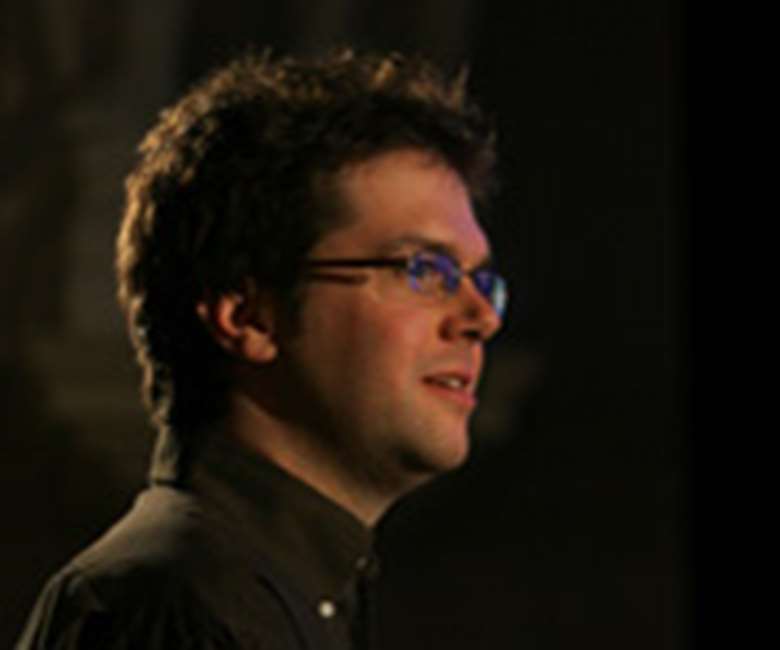Tom Cawley - Piano
Thursday, October 30, 2008
“I’ve got this room upstairs in my house,” says Cawley. “It’s sort of like the culmination of all my childhood dreams, just full of keyboards and pianos.” Music’s always been at the heart of his life. “Dad’s an amateur flautist, and also collects musical ephemera, a sort of one man band. I guess it’s in the genes.” Piano lessons started when Cawley was six, and from there he attended Chetham’s music school in Manchester from the age of eight to 13, “all classical,” he says.

When he returned to normal schooling, he kept having piano lessons and formed a pop band for which he was not only the keyboard player but “regretfully” also the singer. “This was when I bought my first keyboard,” he says, beaming. “I remember it well, it was a Yamaha SY22.” It’s no surprise that Cawley remembers this first purchase.
“I sold my bike and various other things to raise the money I needed to buy the keyboard and then my parents matched what I had managed to raise. So I had this keyboard with Vector Synthesis which was very appealing for a 14-year-old nerd. The Vector Synthesis meant that the sound had four component parts and you had a joystick which you used to switch between and blend parts of the sound.”
Cawley’s first acoustic piano was a Kemble Minx miniature which he still has. “It has a huge sort of sentimental value. Then my parents bought a proper piano which they found at a hotel in Nottinghamshire. It was a 6ft Bluthner grand and that’s still one of my favourite pianos. I love them, they’re really warm and mellow and also they have this unique thing where the top part has four strings instead of three strings on the top notes and the fourth string is a resonance string that sits above the other three – they have more resonance I suppose – and this gives them their unique sound.”
Cawley went on to the Royal Academy of Music when he was 18 to study piano. On leaving, he got a gig with Dave O’Higgins, who wanted him to play more than just the piano so he bought a Hammond organ module, an EMU. Cawley then joined the group Acoustic Ladyland led by saxophonist Pete Wareham.
“We kind of evolved into an electric band despite the name, and now I play the Nord electro which is a virtual electro/mechanical thing. There just doesn’t seem to be anything else that does what this keyboard does quite so well. It does Fender Rhodes, Wurlitzer, Klav and Hammond organ and it’s fantastically good at the Fender Rhodes sound. In fact when I do gigs where there isn’t a piano, I’d much rather take the Nord than a ‘fake’ piano keyboard because it sounds so much more like a Fender Rhodes than a ‘fake’ piano sounds like a piano. And it’s a 61 and very short. It’s great to take through airports and to take around in the car.”
Cawley also plays another keyboard in Acoustic Ladyland, a Nord Modular. “It’s a tiny keyboard with only two octaves, but it’s quite the most complicated synthesiser that I have ever attempted to programme. Modular means that you construct the sound by wiring together modules, like an oscillator, a filter, an envelope, a ring modulator, in fact anything you can think of. There are about 130 different modules in its virtual little brain. You have to plug a computer into it to programme it. The first time I tried it, I triumphantly finished my piece and pressed a note on the keyboard and nothing came out because I hadn’t wired it up properly.
“Once you’ve done that you store it on the keyboard, which has got lots of knobs for twiddling and then it works like a proper keyboard for live – it’s amazing and there’s a certain bijou quality to them also because they’re very small and they’re both bright red. I also have an Alesis Ion which is a three analogue virtual subtractive synthesiser, a big sort of brutal sounding keyboard. It’s like a Moog and does a whole range of wonderful sounds.”
Cawley’s gigging arsenal is all modern and virtual. “In this day and age, why would I want to use anything else? They just sound so good and they’re much more able to deal with being gigged around than the old Moogs and Prophets, which had to be serviced and set up for each individual sound every time you took them on the road. I almost forgot to mention Logic, with all its virtual instruments. It has a fantastic virtual piano that I play when I record things, it’s called Ivory by Synthogy. It’s a multi-sampled Steinway, Bosendorfer and Yamaha C series.”
Then, as if he’s flicked off the virtual switch. “I also have a Fender Rhodes 73 Stage Piano which I bought myself for my thirtieth birthday. It’s an early Mk2 with wooden keys. It’s got the flat top so I can put other keyboards on top of it. It never leaves the house, I just record with it. It brings a lot of joy.”